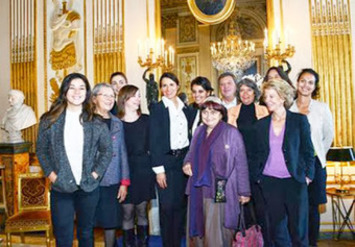France has launched a five-point gender equality charter for its film industry, put together by Le Deuxième Regard, a Paris-based ‘lobby’ (read ‘activist’) group founded by Bérénice Vincent, Delphyne Besse and Julie Billy, who will circulate it for signature, to all segments of the industry.
As you can see in the photo, all the first signatories of the charter were women, powerful women: Veronique Cayla, the head of Arte France the public television channel and Le Deuxième Regard's marraine, or 'godmother'; Najat Vallaud Belkacem, the Women’s Rights Minister; Aurélie Filippetti, the Culture and Communications Minister; Frédérique Bredin, president of the Centre National du Cinéma et de l'Image Animée (CNC) – the state film funding body. It remains to be seen who else will sign the charter. The Cannes Film Festival, perhaps? Its full name is Charte Pour l’Égalité Entre Les Femmes et Les Hommes Dans Le Secteur Du Cinéma and it's there in all its glory at the bottom of the page. Impressive.
Why is this charter necessary, when in France women directors' participation in feature filmmaking is among the strongest in the world? Well, there are problems there that are similar to those everywhere else. According to the Screen Daily article, the CNC reports that in 2012 women directed just 25% of the 77 first features approved, even though French film school annual intake has a gender split of 50:50.
This charter is, I think, unique. Feminists often work behind the scenes for change. But has a feminist group ever initiated and helped to write a charter that key government ministers and industry figures signed in support, in the arts or any other context? And then circulated it for signature, to an entire industry? Anywhere? The charter and its evolving signature process are very different, for instance, from the framework that the Swedish Film Institute uses to advance women directors’ participation in filmmaking, perhaps because the Swedish Film Institute – unlike the CNC – works within an established regulatory context that explicitly promotes gender equity and has monitored gender statistics in film for some time.

|
Scooped by Deanna Dahlsad |
No comment yet.
Sign up to comment



 Your new post is loading...
Your new post is loading...
























Click for more info - and an interview with president Bérénice Vincent.